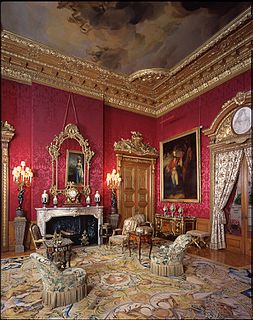
The 1892 United Kingdom general election was held from 4 July to 26 July 1892. It saw the Conservatives, led by Lord Salisbury, win the greatest number of seats, but not enough for an overall majority as William Ewart Gladstone's Liberals won many more seats than in the 1886 general election. The Liberal Unionists who had previously supported the Conservative government saw their vote and seat numbers go down.

Baron Ferdinand de Rothschild, how he was referred to in the UK, or Ferdinand James Anselm, Freiherr von Rothschild was a French-born, Austrian-turned British and Jewish banker, art collector and politician, who was a member of the prominent Rothschild family of bankers. He identified as a Liberal, later Liberal Unionist, MP who sat in the House of Commons from 1885 to 1898. Ferdinand had a sister, Miss Alice, who like her brother was a keen horticulturalist and collector. She inherited Ferdinand's property, Waddesdon Manor, in 1898 after he died and likewise continued the tradition of using the house as a place to keep his impressive collections.
Oxford University was a university constituency electing two members to the British House of Commons, from 1603 to 1950. The last two members to represent Oxford University when it was abolished were A. P. Herbert and Arthur Salter.
Shrewsbury was a parliamentary constituency in England, centred on the town of Shrewsbury in Shropshire.

Edward Heneage, 1st Baron Heneage was a British Liberal and Liberal Unionist politician. He was briefly Chancellor of the Duchy of Lancaster under William Ewart Gladstone between February and April 1886, when he broke with Gladstone over Irish Home Rule and joined the Liberal Unionists.
Croydon was a constituency in the House of Commons of the UK Parliament from 1885 to 1918. As with most in its lifetime following the Redistribution of Seats Act 1885, it was a seat, that is it elected one Member of Parliament (MP) by the first past the post system of election.
The Hastings by-election 1908 was a Parliamentary by-election. Hastings returned one Member of Parliament to the House of Commons of the United Kingdom, elected by the first past the post voting system.
The Gorton by-election, 1889 was a parliamentary by-election held on 22 March 1889 for the British House of Commons in the Gorton Division of Lancashire.

Robert J. Cox FRSE was a Scottish gelatine and glue manufacturer and Liberal Unionist politician.
The Kilmarnock Burghs by-election was a Parliamentary by-election held on 26 September 1911. It returned one Member of Parliament to the House of Commons of the United Kingdom, elected by the first past the post voting system. The constituency consisted of five parliamentary burghs: Kilmarnock in the county of Ayr, Dumbarton in the county of Dumbarton, Rutherglen in the county of Lanark and Renfrew and Port Glasgow in the county of Renfrew.
The Manchester South by-election was a Parliamentary by-election. It returned one Member of Parliament to the House of Commons of the Parliament of the United Kingdom, elected by the first past the post voting system.
The Edinburgh South by-election, 1899 was a parliamentary by-election held for the House of Commons constituency of Edinburgh South in Scotland on 19 June 1899.
The East Worcestershire by-election, 1902 was a parliamentary by-election held for the House of Commons constituency of East Worcestershire on 15 August 1902.
The Aylesbury by-election, 1899 was a parliamentary by-election held for the House of Commons constituency of Aylesbury in Buckinghamshire on 6 January 1899.
The West Derbyshire by-election, 1891 was a parliamentary by-election held for the House of Commons constituency of West Derbyshire on 2 June 1891.
The West Derbyshire by-election, 1900 was a parliamentary by-election held for the House of Commons of the United Kingdom constituency of West Derbyshire on 11 December 1900.
The Cardiff Boroughs by-election, 1886 was a parliamentary by-election held for the House of Commons constituency of Cardiff Boroughs comprising the towns of Cardiff, Cowbridge and Llantrisant in South Wales on 27 February 1886.
The Edinburgh South by-election, February 1886 was a parliamentary by-election held for the House of Commons constituency of Edinburgh South in the Scottish capital on 9 February 1886.
The Derby by-election, 1886 was a parliamentary by-election held for the House of Commons constituency of Derby, the county town of Derbyshire on 9 February 1886.
The Westbury by-election, 1927 was a by-election held on 16 June 1927 for the British House of Commons constituency of Westbury.













